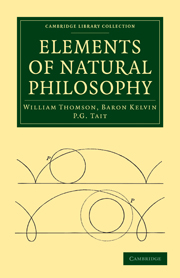CHAP. III - EXPERIENCE
from DIVISION I - PRELIMINARY
Published online by Cambridge University Press: 10 November 2010
Summary
320. By the term Experience, in physical science, we designate, according to a suggestion of Herschel's, our means of becoming acquainted with the material universe and the laws which regulate it. In general the actions which we see ever taking place around us are complex, or due to the simultaneous action of many causes. When, as in astronomy, we endeavour to ascertain these causes by simply watching their effects, we observe; when, as in our laboratories, we interfere arbitrarily with the causes or circumstances of a phenomenon, we are said to experiment.
321. For instance, supposing that we are possessed of instrumental means of measuring time and angles, we may trace out by successive observations the relative position of the sun and earth at different instants; and (the method is not susceptible of any accuracy, but is alluded to here only for the sake of illustration) from the variations in the apparent diameter of the former we may calculate the ratios of our distances from it at those instants. We have thus a set of observations involving time, angular position with reference to the sun, and ratios of distances from it; sufficient (if numerous enough) to enable us to discover the laws which connect the variations of these co-ordinates.
Similar methods may be imagined as applicable to the motion of any planet about the sun, of a satellite about its primary, or of one star about another in a binary group.
- Type
- Chapter
- Information
- Elements of Natural Philosophy , pp. 106 - 116Publisher: Cambridge University PressPrint publication year: 2010First published in: 1873

